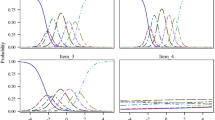Abstract
The objective of this study is to construct a valid and reliable scale to measure the happiness perception of secondary school students (SHPS). The scale constructed as 28 items was applied to high schools of all different types in İlkadım, Samsun. The scale was applied to a total number of 305 (179 females, 126 males) students. Among the scale construction methods, item analysis, exploratory and confirmatory factor analysis, and reliability analysis were conducted in the study. The results yielded a 22-item scale of 4 factors with a 46.352 variance. As in line with their contents, the dimensions of the scale were named as social happiness perception, self-esteem, personal opposition, and psychological satisfaction. Cronbach’s alpha reliability test, conducted to provide evidence for the scale reliability, resulted in 0.787. The results of analysis showed that the scale is adequate for revealing the happiness perception of the students.
Access this chapter
Tax calculation will be finalised at checkout
Purchases are for personal use only
Similar content being viewed by others
References
Büyüköztürk, Ş. (2002). Faktör analizi: Temel kavramlar ve ölçek geliştirmede kullanımı. Kuram ve Uygulamada Eğitim Yönetimi Dergisi, 8 (32)
Çobanoğlu, F. (2008). Değişim mantığını anlamak: akış ve dönüşüm olarak örgüt. Pamukkale Üniversitesi Eğitim Fakültesi Dergisi, 23, 110–119.
Demirtaş, H. (2006). Yönetim kuram ve yaklaşımları eğitiminin ilköğretim okulu öğretmenlerinin sınıf yönetimi paradigmalarına etkileri. Eğitimde Politika Analizleri ve Stratejik Araştırmalar Dergisi (INASED), 1(1), 49–70.
Diener, E. (2000). Subjective Well-being, the science of happiness and a proposal for a National Index. American Psychologist, 55(1), 34–39.
Engels, N., Aelterman, A., Van Petegem, K., & Schepens, A. (2004). Factors which influence the Well-being of pupils in Flemish secondary schools. Educational Studies, 30(2), 127–143.
Erçetin, Ş.Ş. (2014). Chaos, complexity and leadership. Springer Cham Heidelberg New York Dordrecht London © Springer International Publishing Switzerland 2016. Library of Congress Control Number: 2015951455.
Eryılmaz, A., & Öğülmüş, S. (2010). Ergenlikte Öznel İyi Oluş ve Beş Faktörlü Kişilik Modeli. Ahi Evran Üniversitesi Kırşehir Eğitim Fakültesi Dergisi, 11(3), 189–203.
Jacobsen, B. (2007). What is happiness? Author(s): Existential analysis. Journal of the Society for Existential Analysis, 18(1), 39–50. 12p.
Kangal, A. (2013). Mutluluk Üzerine Kavramsal Bir Değerlendirme Ve Türk Hane Halkı İçin Bazı Sonuçlar. Elektronik Sosyal Bilimler Dergisi. Kış-2013, 12(44), 214–233.
Lyubomirsky, S. (2001). Why are some people happier than others: The role of cognitive and motivational processes in Well-being. American Psychologist, 56, 239–249.
Michalos, A.C. (1991) Global Report on Student Well-Being: Volume 1, Life Satisfaction and Happiness, Springer-Verlag, New York.
Wilson, W. (1967). Correlates of avowed happiness. Psychological Bulletin, 67, 294–307.
Author information
Authors and Affiliations
Corresponding author
Editor information
Editors and Affiliations
Rights and permissions
Copyright information
© 2019 Springer International Publishing AG, part of Springer Nature
About this paper
Cite this paper
Erçetin, Ş.Ş., Topaloğlu, H. (2019). Scale Construction for Revealing the Happiness Perception of Secondary School Students. In: Erçetin, Ş., Potas, N. (eds) Chaos, Complexity and Leadership 2017. ICCLS 2017. Springer Proceedings in Complexity. Springer, Cham. https://doi.org/10.1007/978-3-319-89875-9_25
Download citation
DOI: https://doi.org/10.1007/978-3-319-89875-9_25
Published:
Publisher Name: Springer, Cham
Print ISBN: 978-3-319-89874-2
Online ISBN: 978-3-319-89875-9
eBook Packages: Social SciencesSocial Sciences (R0)



